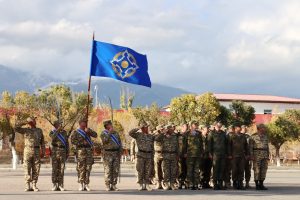Armenia has opted out of participating in upcoming military exercises orchestrated by the Russia-led Collective Security Treaty Organization (CSTO), lending further credence to discussions of Armenia’s intent to part ways with the military alliance.
Yerevan is reportedly missing the Cobalt-2024 exercise scheduled to take place August 14-16 in Novosibirsk, Russia. Russian media reports on the exercise do not list Armenia among the participants. Armenia also does not plan to attend another trio of upcoming exercises – Cooperation-2024, Search-2024, and Echelon-2024 – to be held in Kyrgyzstan September 3-15. A CSTO press release outlining the drills explicitly noted, “The Armenian side informed that it does not plan to participate in the exercises.”
The CSTO launched in 2002, an evolution of the post-Soviet Collective Security Treaty (CST) which had been formed in 1992. The alliance currently counts among its members Armenia, Belarus, Kazakhstan, Kyrgyzstan, Tajikistan, and Russia – the latter widely viewed as leading the organization by dint of its massive size and overwhelming influence. Uzbekistan had been party to the CST but declined to extend its association in 1999, a decision also made by Georgia and Azerbaijan. Tashkent, however, did join the CSTO in 2006, but withdrew in 2012.
Armenia is on track to be the CSTO’s second full member to withdraw.
In June, Armenian Prime Minister Nikol Pashinyan denounced the CSTO for failing to come to Armenia’s aid in its conflict with Azerbaijan. “We will leave,” Pashinyan said during a parliament session. “We will decide when to leave. We won’t come back, there is no other way.”
As DW reported, however, there have been mixed diplomatic signals. After Pashinyan’s comments hit headlines, Armenian Foreign Minister Ararat Mirzoyan said the country hadn’t announced a withdrawal from the CSTO yet. “Those who assert that the prime minister said that Armenia is withdrawing from the CSTO are mistaken,” Mirzoyan said.
When Azerbaijan launched attacks and seized Armenian-controlled territory in September 2022 – an escalation and extension of the long-frozen Nagorno-Karabakh conflict – Yerevan invoked CSTO Article 4, which provides a guarantee of the “safety, stability, territorial integrity, and sovereignty” of a member state by all the member countries against external aggression. But, as Saadi Khamidov explained in an article for the The Diplomat last year:
[I]n the aftermath of this event, Armenia was greeted with a small CSTO mission dispatched to do some fact-finding and observation. With Russia preoccupied with its war in Ukraine, it does not come as a surprise that the CSTO’s response was so irresolute. For Yerevan, nevertheless, it is an indication that Russia can no longer guarantee Armenia’s security, which is of particular concern for a country that is sandwiched between two hostile neighbors: Azerbaijan and Turkey. This represents a blot on the credibility of the CSTO in the eyes of the Armenian government and the public.
Since 2022, Armenia’s relations with the CSTO – and Russia – have continued to worsen.
Armenia skipped the CSTO’s late November 2023 summit in Minsk and that same month formally registered its ratification of the Rome Statute of the International Criminal Court (ICC). In February 2024 Pashinyan said Armenia had “frozen” its membership in the CSTO. In February Armenia’s ICC membership came into effect, meaning that should Russian President Vladimir Putin step foot in the country, Yerevan is obliged to arrest him, given an ICC warrant for the Russian president’s arrest. In May, the Armenian Foreign Ministry announced that it would not sign the CSTO’s 2024 budget
When it comes to military exercises, the upcoming engagements in Russia and Kyrgyzstan are not the first Yerevan has skipped. Indestructible Brotherhood-2024 – a command and staff exercise with the CSTO Peacekeeping Forces – took place in Kazakhstan in June without Armenia.
Indeed, abstaining from such exercises flows naturally from Pashinyan’s statement that the Armenian relationship with the CSTO is “frozen” and the ensuing budget decision.
The only question appears to be when – not if – Armenia formally parts ways with the CSTO.

































